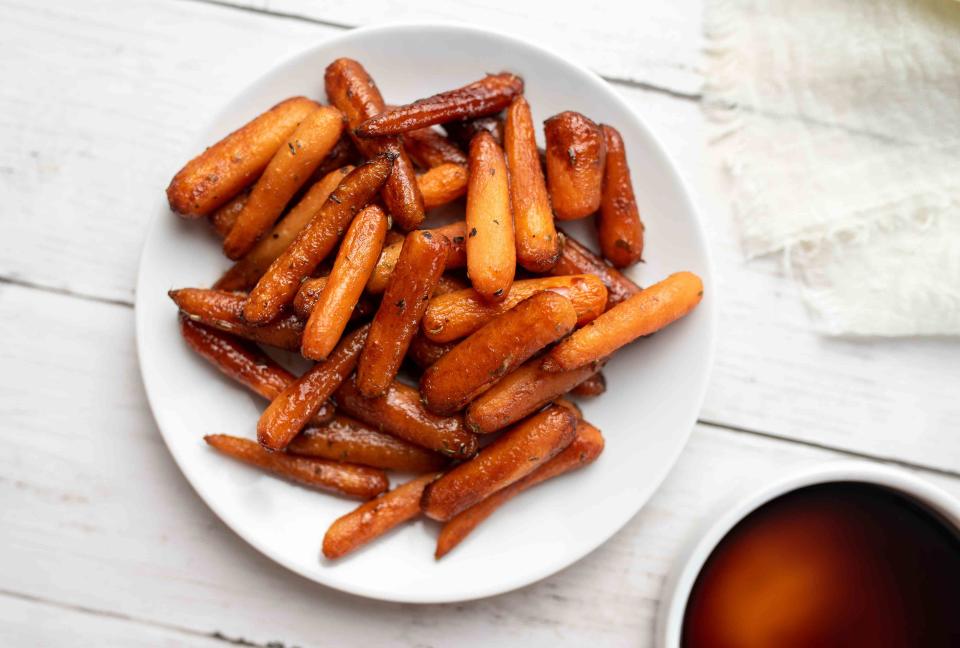3 Baby Carrot Myths We Need to Debunk Right Now
Go ahead, eat those baby carrots.

Tatyana Consaul / Getty Images
Life can be tough. Between school or work, raising kids, or taking care of a home, fitting everything into a single day can feel downright impossible. And that's why we're here to defend going ahead and buying the baby carrots if you want them.
All too often, baby carrots are maligned on the internet for being a wasteful pre-cut product we can all do without. But here's the thing: Sometimes, cutting out even a few minutes of prepping carrots into bite-sided snacks takes the pressure off an already hectic day. That, and a lot of the negative things you may think about baby carrots, is total internet lore. Here, we debunk three of the biggest myths you may have thought about baby carrots, so you can go ahead and enjoy these dippable veggies whenever you like.
No, They Aren't Soaked in Bleach
A pervasive baby carrot myth is that they get that white little sheen and last so long on store shelves because they are soaked in bleach or a chemical known as chlorpropham. This, my friends, is not even close to true.
"The chemical chlorpropham, sold under various brand names, including Bud Nip, is not used on carrot crops or on stored carrots in the United States and is banned from any food uses in the European Union," Reuters explained in its debunking story — a claim that has also been thoroughly debunked by Snopes and Politifact.
Related: Chipotle-Roasted Baby Carrots
However, as Dana Brennan, a vice president with Grimmway Farms, explained to Reuters, chlorinated water is often used to clean all carrots.
“When we wash and cool our carrots, a small amount of chlorine is used in the water to help prevent the potential spread of food-borne pathogens," Brennan said. "This is a common, industry-standard practice and is approved for use by our organic certifying agency, California Certified Organic Farmers (CCOF), and well within the limits established by the FDA."
No, They Don't Lack Nutrition
Baby carrots are indeed just as nutritious as regular-sized carrots. How? Because they were once regular-sized carrots, that were cut down to size. "They are just regular carrots that have been peeled, washed, and chopped into two-inch pieces to create easy-to-eat finger food," the New York Times wrote in a story in 2017. However, to make baby carrots, manufacturers do have to peel the skin, which is often packed with vitamins and minerals, so we do lose that in the process. You can compare the nutritional guidelines for mature, raw carrots and prepared baby carrots on the USDA's website.
Baby Carrots Aren't as Environmentally Unfriendly as You Think
Yes, baby carrots take a little bit of processing power, however, it's often processing produce people wouldn't buy in the grocery store anyway.
Related: Consumer Reports Found 'Alarming' Levels of Pesticides in US Produce
"And carrots that (the) baby carrots are made of are thin ones, so it is very likely they would not be sold as regular carrots in the market anyway," Soohyoun Ahn, a lecturer in food science and human nutrition at the University of Florida and founder of the Florida Food Entrepreneurship, told Politifact. "So, I personally believe this is a great way to use foods without creating any waste."
In fact, baby carrots were created in the mid-'80s by Mike Yurosek, a farmer from California, and his son, Dave, after they noticed about half their crop had to be thrown away because they wouldn't pass grocery store standards.
"Thirty-five to forty-five percent of our carrots were rejected because of cosmetic situations – bent, broken," Yorosek told CBS in 2022. "That's what kind of drove me, as to say, 'OK, how do we do something with that product and make it sellable?'" And now, according to the Washington Post, about 70% of the carrots we eat are in baby form. Don't worry about the scraps — they're often used for compost, animal feed, or even turned into juice.
Related: Amazon Says Its New Unlimited Grocery Delivery Subscription Practically Pays for Itself
Oh, and back to making life easier, it was also Yurosek's wife who long wished for baby carrots because she, too, didn't want to spend more time food prepping than she needed.
"She told me, 'Why can't you do something ... so I don't spend three hours in a kitchen, making it,'" Yorosek shared with CBS. So, just know, you're not alone. And you should feel no shame about your baby carrots.
For more Food & Wine news, make sure to sign up for our newsletter!
Read the original article on Food & Wine.
